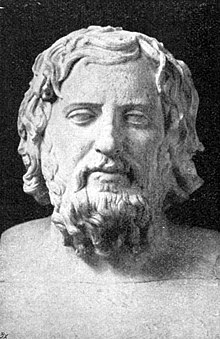Xenophon
| Xenophon of Athens | |
|---|---|

The Greek historian Xenophon of Athens.
|
|
| Born | c. 430 BC Athens |
| Died | 354 BC (aged approx. 76) |
| Occupation | Historian, soldier, mercenary |
| Ethnicity | Greek |
Xenophon of Athens (/ˈzɛnəfən, -ˌfɒn/; Greek: Greek pronunciation: [ksenopʰɔ̂ːn], Xenophōn; c. 430–354 BC) was an ancient Greek philosopher, historian, soldier and mercenary, and a student of Socrates. As a historian, Xenophon is known for recording the history of his contemporary time, the late-5th and early-4th centuries BC, such as the Hellenica, about the final seven years and the aftermath of the Peloponnesian War (431–404 BC); as such, the Hellenica is a thematic continuation of the History of the Peloponnesian War, by Thucydides. As a mercenary soldier of the Ten Thousand, he participated in the failed campaign of Cyrus the Younger, to claim the Persian throne from his brother Artaxerxes II of Persia, and recounts the events in Anabasis (An Ascent), his most notable history.
Despite being an Athenian citizen, born to Gryllus, of the deme Erchia of Athens, Xenophon of Athens also was associated with city-state of Sparta, the traditional enemy of Athens. As such, his pro-oligarchic politics, military service under Spartan generals, in the Persian campaign and elsewhere, and his friendship with King Agesilaus II endeared Xenophon to the Spartans; thus, some of his works have an admiring pro–Spartan bias, especially the royal biography Agesilaus and the Constitution of the Spartans.
...
Wikipedia
